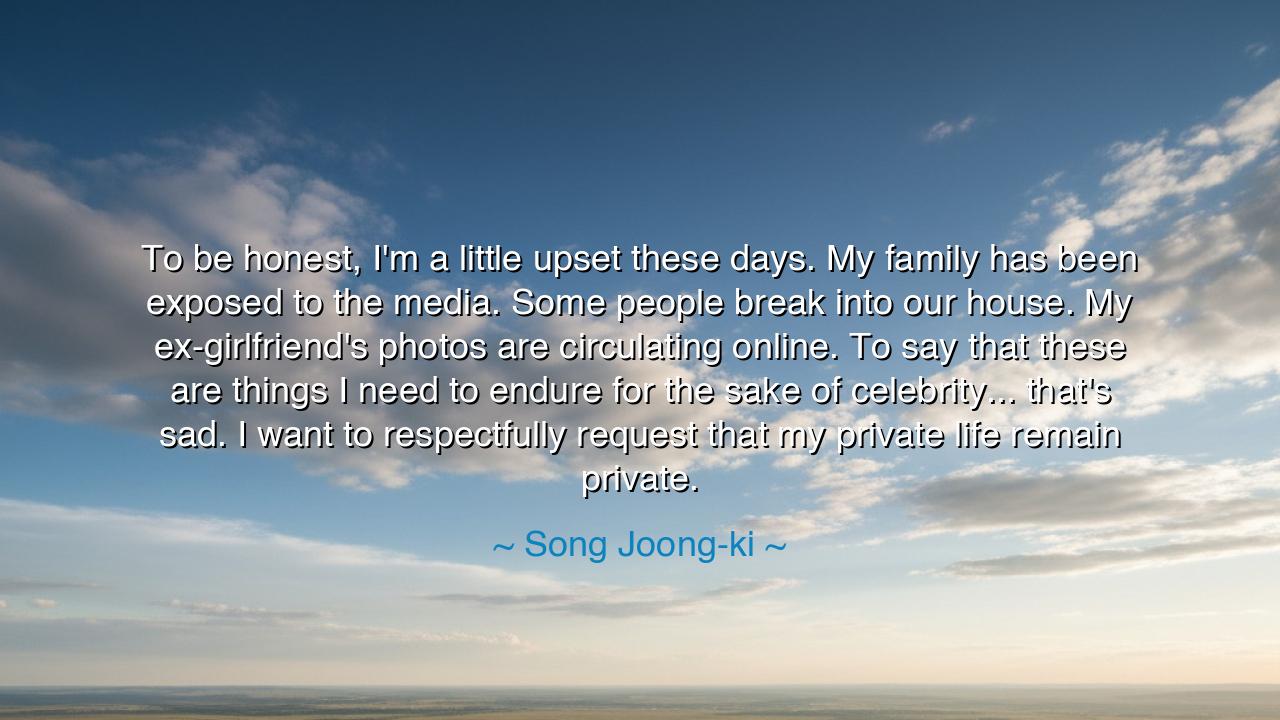
To be honest, I'm a little upset these days. My family has been
To be honest, I'm a little upset these days. My family has been exposed to the media. Some people break into our house. My ex-girlfriend's photos are circulating online. To say that these are things I need to endure for the sake of celebrity... that's sad. I want to respectfully request that my private life remain private.






When Song Joong-ki said, “To be honest, I'm a little upset these days. My family has been exposed to the media. Some people break into our house. My ex-girlfriend's photos are circulating online. To say that these are things I need to endure for the sake of celebrity... that's sad. I want to respectfully request that my private life remain private,” he spoke not merely as an actor burdened by fame, but as a man yearning for the most sacred right of all — the right to human dignity. His words carry the quiet anguish of one who has discovered that the light of fame, though radiant, casts long and merciless shadows. In them lies a truth that the ancients would have recognized: that exposure without restraint becomes violation, and that when the crowd forgets compassion, even the celebrated become prisoners of their own names.
Fame, though it glitters, has always been a double-edged gift. The Romans once paraded their heroes through the streets, showering them with laurel crowns and cries of adoration — yet in that same moment of triumph, a slave stood behind the victor, whispering into his ear, “Memento mori — remember, you are mortal.” It was a reminder that applause is fleeting, and that the eyes of the multitude, once filled with admiration, can turn into instruments of intrusion and cruelty. Song’s lament echoes this ancient wisdom. What was once admiration for his art has become obsession with his person, and the boundary between admiration and invasion has been shattered.
In this quote, we see the agony of one who lives in a world where the public gaze has no mercy. To the modern crowd, privacy is an illusion, and the famous are consumed as if they were not people but stories, commodities, and symbols. Yet Song reminds us that even those in the light are human — with families, fears, and a longing for peace. His sadness is not only personal but prophetic, for it speaks to an age in which technology amplifies curiosity into cruelty. The mob that once gathered in the arena now gathers behind screens, tearing down the walls of another’s life with a click or a share.
The ancients would have called this a desecration of the sacred self. In Greek philosophy, there was the concept of sophrosyne — moderation, self-restraint, the balance between public and private life. Without it, society decays into noise and chaos. What Song Joong-ki asks for is not privilege, but sophrosyne: the right to keep his heart and home intact, to live as a man and not as an endless spectacle. When he says, “That’s sad,” he speaks for every soul who has been stripped of stillness, every heart that has been made to bleed for the amusement of others.
History remembers many such souls. Consider Princess Diana, whose life was consumed by the same merciless fire of attention. She, too, asked for privacy — for a small space of peace in which to raise her children and breathe. Yet the world refused, and the same flashing cameras that once adored her later chased her into darkness. Her story is the eternal warning of what happens when fame devours humanity, when the idol becomes the offering. Song’s plea, gentle yet sorrowful, is a continuation of that warning — a reminder that even beauty, talent, and grace cannot survive without the shelter of privacy.
The lesson here is profound and humbling. We must learn once again to look upon the lives of others — especially the celebrated — with reverence, not hunger. Admiration should never become possession, and curiosity must always bow before compassion. When we strip another of privacy, we strip ourselves of empathy. The wise understand that to love an artist is not to consume his life, but to honor his work; to admire his gifts, yet respect the silence from which those gifts are born.
So, O listener, let this be your teaching: guard your own privacy, and honor the privacy of others. Do not join the chorus of those who feed upon another’s vulnerability. Remember that every life, whether seen by millions or by none, deserves the same sacred boundary of dignity. For the soul that lives always in the gaze of others loses its peace, and the crowd that forgets to respect that boundary loses its humanity. As Song Joong-ki reminds us, even the brightest stars need darkness to shine — not the darkness of sorrow, but the quiet sanctuary where they can simply be human once more.






AAdministratorAdministrator
Welcome, honored guests. Please leave a comment, we will respond soon